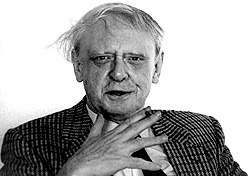Anthony Burgess Quotes
People, Joseph Conrad, Doris Lessing
“…the Malay word chium meant to plough the beloved’s face with one’s nose”
Fiction, Beds in the East (1959)
Fiction, The Enemy in the Blanket (1958)
“I know what is love. Love is man and woman in bed.”
Fiction, Beds in the East (1959)
Non-Fiction, Homage to QWERT YUIOP: Selected Journalism 1978-1985 (1986)
Non-Fiction, A Mouthful of Air: Language and Languages, Especially English (1992)
Non-Fiction, Joysprick: An Introduction to the Language of James Joyce (1973)
“You drink wine, you have foreskins. These things have been observed.”
Fiction, Napoleon Symphony (1974)
Non-Fiction, A Mouthful of Air: Language and Languages, Especially English (1992)
“(Singapore) is not even a place where a white man is permitted to go to pieces….”
"Tanah Melayu".
Non-Fiction, Homage to QWERT YUIOP: Selected Journalism 1978-1985 (1986)
“Writers are not, by nature, respectable: their function is to be subversive.”
Non-Fiction, Homage to QWERT YUIOP: Selected Journalism 1978-1985 (1986)
Non-Fiction, A Mouthful of Air: Language and Languages, Especially English (1992)
“All art preserves mysteries which aesthetic philosophers tackle in vain.”
Non-Fiction, A Mouthful of Air: Language and Languages, Especially English (1992)
“There is a profound middle-class nostalgia for the days of British protection….”
Non-Fiction, Homage to QWERT YUIOP: Selected Journalism 1978-1985 (1986)
Non-Fiction, A Mouthful of Air: Language and Languages, Especially English (1992)
Fiction, Napoleon Symphony (1974)
Non-Fiction, Homage to QWERT YUIOP: Selected Journalism 1978-1985 (1986)
Fiction, The Right to an Answer (1960)
Fiction, Beds in the East (1959)
Fiction, The Right to an Answer (1960)
Fiction, Devil of a State (1961)
Non-Fiction, The Novel Now: A Student's Guide to Contemporary Fiction (1967)
“An Egyptian priest…. plays up the mystery of language to enhance his own power.”
Non-Fiction, A Mouthful of Air: Language and Languages, Especially English (1992)
'The Rage of D.H. Lawrence', The South Bank Show (TV), 1985
People, Joseph Conrad, D.H. Lawrence
Fiction, The Doctor is Sick (1960)
Fiction, The Enemy in the Blanket (1958)
Fiction, Beds in the East (1959)
“…Australian English may be thought of as a kind of fossilised Cockney of the Dickensian era.”
Non-Fiction, A Mouthful of Air: Language and Languages, Especially English (1992)
Fiction, A Clockwork Orange (1962)
Non-Fiction, English Literature: A Survey for Students (1958, revised 1974)
Non-Fiction, Homage to QWERT YUIOP: Selected Journalism 1978-1985 (1986)
Fiction, Napoleon Symphony (1974)
"White Men Sweating" - review of The British in Malaya 1880-1941: The Social History of a European Community in Colonial South-East Asia, by John G. Butcher.
Non-Fiction, Homage to QWERT YUIOP: Selected Journalism 1978-1985 (1986)
“The scientific approach to life is not necessarily appropriate to states of visceral anguish.”
Fiction, Tremor of Intent (1966)
“He forgot that the Malays revere cats and that the Chinese merely relish them.”
Fiction, The Enemy in the Blanket (1958)
Fiction, Napoleon Symphony (1974)
Fiction, Devil of a State (1961)
“…a fetid cabaret with a beer-bar, two houses of ill-fame disguised as coffee-shops…”
Fiction, Beds in the East (1959)
Fiction, Earthly Powers (1980)
